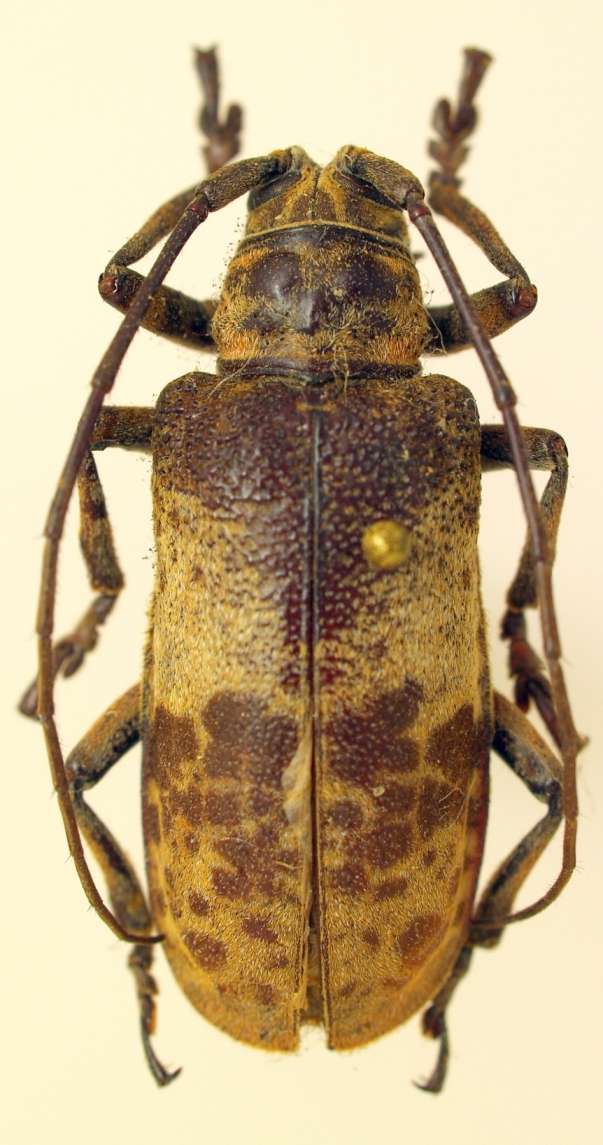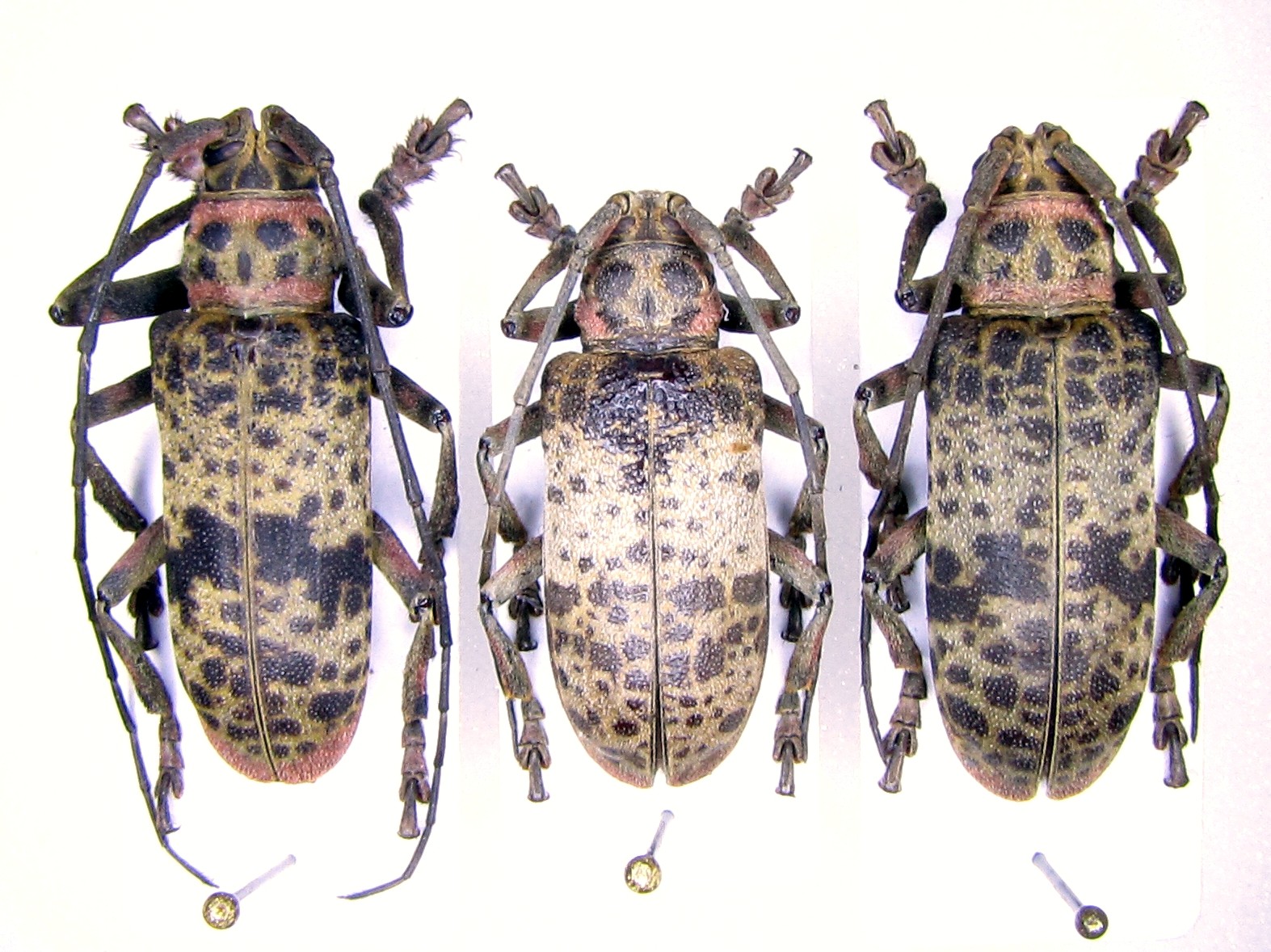| Author |
 Topic Topic  |
|
|
Gerard
Scientific Collaborator
    
France
5473 Posts |
 Posted - 29/08/2018 : 18:05:03 Posted - 29/08/2018 : 18:05:03



|

470.31 KB
Cameroun, Ebogo, taille 23 mm |
Edited by - Xavier on 28/08/2020 17:21:09 |
|
|
Capitaine
Scientific Collaborator
   
France
1850 Posts |
 Posted - 31/08/2018 : 11:32:28 Posted - 31/08/2018 : 11:32:28



|
| Regarde du côté de Ceroplesis molator ou buettneri.. |
Claude |
 |
|
|
Gerard
Scientific Collaborator
    
France
5473 Posts |
 Posted - 01/09/2018 : 15:55:35 Posted - 01/09/2018 : 15:55:35



|
| Merci Claude, je vais chercher dans ce coté. |
 |
|
|
Jérôme Sudre
Member Rosenbergia
   
France
1816 Posts |
 Posted - 02/09/2018 : 18:06:47 Posted - 02/09/2018 : 18:06:47



|
Bonjour
Vraisemblablement il s'agit de C molator |
 |
|
|
Gerard
Scientific Collaborator
    
France
5473 Posts |
 Posted - 02/09/2018 : 19:17:40 Posted - 02/09/2018 : 19:17:40



|
Merci Jérôme  |
 |
|
|
Vitali
Member Rosenbergia
   
Estonia
1016 Posts |
 Posted - 23/08/2020 : 21:50:51 Posted - 23/08/2020 : 21:50:51



|
Sorry, Jérôme, but I am still confused.
According to Breuning's revision, Ceroplesis molator is distinguished by a very narrow interval between antennae and transverse rose lines along the apical and basal edge of pronotum, while other species with a similar colour pattern have a wider gap between antennae and no rose lines.
I am placing below the photo of three beetles.

449.49 KB
It seems to me that the left and right beetles are correspondingly a male and a female of C. molator, both with very narrow interval between antennae.
The stouter beetle in the middle, similar to the Gerard's specimen and having wider interval between antennae, seems to be a different species. I regarded this to be C. buettneri (see, e.g., here, where also the broader interval between antennae is better visible), but Breuning gives the size 25-35 mm for this species, while all my specimens are smaller than 25 mm.
So, I don't know now. What do you think? |
 |
|
|
Jérôme Sudre
Member Rosenbergia
   
France
1816 Posts |
 Posted - 28/08/2020 : 15:42:29 Posted - 28/08/2020 : 15:42:29



|
Yes yes yes ....indeed you're right it's buettneri and not molator Fab especially since I had seen the photo of the Fabricius typus a long time ago, I had put under my ex "compared to the photo of the typus"! But indeed I did not look on the photo here the spacing between the tubers of the antennas! Mea culpa !
On the other hand the elytral drawings can be very variable
I could see ex (materialized) which did not necessarily have the elements of characters given by Breuning in his revision and it was indeed molator, but on the other hand, yes, the space between the tubers of the antennas is relatively reliable although presenting sometimes a certain variability also. As for the dimensions it remains very relative reason why I will not advance too much on this ground because if certain species are indeed and clearly smaller or larger than others there between molator, buettneri it is not obvious.
Your specimen of the medium would it not be C adusta?
After, there is another species very close to this complex it is blairi which is on the other hand him, smaller !
In any case yes on the photograph it is probably buettneri ! Sorry...for the error! What a mess the Ceroplesis between Breuning and Fiedler is a hell of a bag of knots !
I will give up entomology and collect matchboxes it will be easier!!! |
Edited by - Jérôme Sudre on 28/08/2020 15:56:32 |
 |
|
|
Xavier
Scientific Collaborator
    
France
12547 Posts |
 Posted - 28/08/2020 : 17:20:51 Posted - 28/08/2020 : 17:20:51



|
| So, Ceroplesis buettneri (Kolbe, 1893). |
 |
|
|
Vitali
Member Rosenbergia
   
Estonia
1016 Posts |
 Posted - 30/08/2020 : 23:14:56 Posted - 30/08/2020 : 23:14:56



|
quote:
Originally posted by Jérôme Sudre
Your specimen of the medium would it not be C adusta? After, there is another species very close to this complex it is blairi which is on the other hand him, smaller !
I cannot completely exclude anything.
I suspected that might be C. adusta as well because of pink pronotum sides, but it is very different from C. adusta I have from other regions (e.g., from Uganda).
You are completely right, there is a complete mess in this group of spotty species. Even my physics is easier, not only matchboxes collecting. I am not even sure the beetle placed in BioLib is really C. adusta, though I used to trust BioLib.
Concerning C. blairi, there are a few nice photos of that species here and here.
This species does not have a clear white band... if everything is correct  |
 |
|
|
Jérôme Sudre
Member Rosenbergia
   
France
1816 Posts |
 Posted - 31/08/2020 : 07:14:14 Posted - 31/08/2020 : 07:14:14



|
I will look in more detail, the variability in the Ceroplesis is still complicated because this kind is difficult to study. Especially some species complexes.
I have blairi in my collection (compared to the type in the Museum of Basel) and they are indeed very different, smaller etc... after I expressed this in relation to the fact that they are part of this specific complex: adusta, buettneri, molator and maybe others.... I will look at your ex in more detail if I can?
Concerning the matchbox collection I was thinking that it would certainly be easier than the African longhorned beetles...
I'll keep you posted.
I have quite a few Ceroplesis in collection and some species without having seen the types are determined to "confer" because the descriptions lack character elements; moreover, many of Breuning's descriptions are a bit limiting, and Fiedler by wanting to arrange the whole thing and gather (although his work is good! and the good idea) about me he didn't make things easy for me ! |
 |
|
|
Francesco
Forum Admin
    
Luxembourg
9655 Posts |
 Posted - 03/10/2020 : 16:25:16 Posted - 03/10/2020 : 16:25:16




|
quote:
Originally posted by Xavier
So, Ceroplesis buettneri (Kolbe, 1893).
No, since the elytral disk does not show spots on the middle and the habitus is too stout.
In my opinion, it is C. adusta. |
 |
|
|
Jérôme Sudre
Member Rosenbergia
   
France
1816 Posts |
 Posted - 04/10/2020 : 09:44:22 Posted - 04/10/2020 : 09:44:22



|
Tu as raison Francesco C adusta ! Déterminer par photo ça me "dévarie" !
Et en poussant un peu plus loin ça à même des airs de Mimoceroplesis coussementi Breuning ! Qui soit dit en passant est un Ceroplesis les caractères génériques donnés se retrouvent chez la plupart des Ceroplesis du coup coussementi n'appartient pas à un genre différent.A tranférer dans le genre Ceroplesis . |
Edited by - Jérôme Sudre on 04/10/2020 09:48:42 |
 |
|
| |
 Topic Topic  |
|


